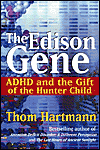The following text, "Yesterday's Child" by Janie Bowman, was originally published in The Missing Piece (Winter 1993), the newsletter of the Learning Disabilities Association of Washington State.
Yesterday's child was born in the 1800s. As a young boy, he was considered medically fragile. Every respiratory illness known to mankind in that age seemed to seize him. Even though Yesterday's child spent many of his early years ill, this did not stop his insatiable curiosity and boyish escapades. Today's child would be described as "just being a boy."
ADD: Curious? Or No Common Sense?
Yesterday's child often found himself in risky life-and-death situations. One time, around the age of five, this boy nearly drowned in a canal; and later he almost smothered as he sank into the depths of a grain elevator. Today's child would be described as "having no common sense."
Yesterday's child was found asleep in the barn in a nest he had constructed, lying on top of the chicken and goose eggs he was trying to hatch. Today's child would be called "weird, eccentric." "Get off those eggs, you'll crack them!"
ADHD: Asking Questions in Order to Learn
Yesterday's child drove his parents to exhaustion by his persistent questioning of the world around him, determined to know the "whys," "what fors," and "what abouts" of his world. Today's child is searching for someone to ask the questions to.
Yesterday's child, with no malice aforethought but only out of the intense curiosity of an inquisitive mind, set his father's barn on fire. For this he was publicly thrashed by his father, who tried to instill in him the serious consequences of his actions. Today's child would be called a "juvenile delinquent."
After only three months of formal education, Yesterday's child walked out of his school in a fit of rage. Running home, he could hear the thoughts of the schoolmaster echoing in his head: "stupid . . . stubborn . . . difficult." Thus, at the tender age of eight, Yesterday's child refused to return to school. The next day, Yesterday's mother gave the schoolmaster a piece of her mind and withdrew the boy from school. From that day onward, she became Yesterday's teacher. Today's child would be called "a problem child, a bad boy, oppositional." And Today's mother would be told she was "highly excitable, and coddling her child." She would be encouraged by all the experts to force her child to return to school because "He'll outgrow it. He's got to learn to adjust."
Yesterday's child went swimming with a friend in a nearby creek. When the friend didn't surface for air, Yesterday's child waited for what seemed like forever. As darkness fell, he—in his own unique five-year-old logic—concluded that it was time to go home. As the town was trying to piece together the disappearance and drowning of his friend, Yesterday's child tried to explain how he waited for what seemed like forever.... Today's child would be treated for "Conduct Disorder" and undoubtedly find himself one step away from the juvenile justice system.
Understanding Consequences or Discovering Them
Yesterday's child just couldn't comprehend consequences; that much seems true. One day he attached wires to the tails of two cats and energetically rubbed their fur. This experiment in static electricity went astray when he was brutally clawed. In another instance, one unsuspecting childhood friend suffered an upset stomach after Yesterday's child gave him some sort of powder just to see if the resulting gas it produced would send him flying. Today's child would be in long-term therapy for Attention Deficit Hyperactivity Disorder, Pervasive Development Disorder, or some other behavioral disorder.
Yesterday's mother complained constantly about the life-threatening condition of his bedroom. Fearing for the safety of her family and any others who ventured into the family home, Yesterday's mother moved his experiments into the cellar. Yesterday's child called it his laboratory and immersed himself in science, to the exclusion of what other "normal" kids were doing at his age. Today's child would be called "Schizoid," and Today's family would be labeled "dysfunctional." Today's child would be spending time in a court-ordered alternative school program, meeting with a psychiatrist twice a week for therapy, and be attending a class to learn social skills.
Appreciating and Accepting ADHD Abilities
At age twelve Yesterday's child insisted on going to work and began successfully earning his own wage. Today's child, at that age, would face a closed door to the world of mentorship in the workplace. Today's child would have to search beyond home and work for other avenues to have his abilities accepted and appreciated.
As you read about Yesterday's child, you are probably wondering how he could have survived and how he could have contributed to society in a positive way. Clearly, Yesterday's child had somebody who accepted his uniqueness, changed his environment to meet his needs, was not intimidated by his gifts, and tried sincerely to see the world through his eyes.
Yesterday's child's name is Thomas Alva Edison.
What is your child's name?
Reprinted with permission of the publisher, Park Street Press.
©2003. www.InnerTraditions.com
This article was excerpted with permission from the FOREWORD of the book:
The Edison Gene: ADHD and the Gift of the Hunter Child
by Thom Hartmann.
 Thom Hartmann, citing examples of significant innovators of our modern era, argues that the brains of the children who possess the Edison gene are wired to give them brilliant success as innovators, inventors, explorers, and entrepreneurs, but that those same qualities often cause them problems in the context of our public schools. He offers concrete strategies for helping Edison-gene children to reach their full potential and shows that rather than being “problems,” they are an important and vital gift to our society and world.
Thom Hartmann, citing examples of significant innovators of our modern era, argues that the brains of the children who possess the Edison gene are wired to give them brilliant success as innovators, inventors, explorers, and entrepreneurs, but that those same qualities often cause them problems in the context of our public schools. He offers concrete strategies for helping Edison-gene children to reach their full potential and shows that rather than being “problems,” they are an important and vital gift to our society and world.
Info/Order this book
About the Author
Thom Hartmann is the award-winning, best selling author of over a dozen books, including Attention Deficit Disorder: A Different Perception, The Last Hours of Ancient Sunlight,and Unequal Protection. He is a former psychotherapist and one of the founders of The Hunter School, a residential and day school for children with ADHD. Visit his website at: www.thomhartmann.com





























